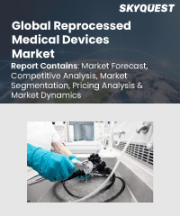
|
시장보고서
상품코드
1899854
리프로세스 의료기기 시장 규모, 점유율, 성장 분석 : 제품별, 유형별, 최종사용자별, 지역별 - 업계 예측(2026-2033년)Reprocessed Medical Devices Market Size, Share, and Growth Analysis, By Product (Cardiovascular, Laparoscopic), By Type (Third-Party Reprocessing, In-House Reprocessing), By End User, By Region - Industry Forecast 2026-2033 |
||||||
리프로세스 의료기기 시장 규모는 2024년에 30억 1,000만 달러로 평가되며, 2025년 34억 5,000만 달러에서 2033년까지 101억 9,000만 달러로 성장할 전망입니다. 예측 기간(2026-2033년)의 CAGR은 14.5%로 예측됩니다.
의료폐기물 감축이 의료현장에서 시급한 과제로 떠오른 데다, 비용 절감 효과와 그 이점에 대한 인식이 높아지면서 재처리 의료기기 시장이 성장세를 보이고 있습니다. 만성질환 증가와 고령화 사회의 진전은 특히 수술 분야에서 이러한 장비에 대한 수요를 더욱 부추기고 있습니다. 의료 인프라 강화와 정부의 적극적인 의료기기 재처리 촉진 정책이 큰 비즈니스 기회를 창출하고 있습니다. 또한 재처리는 폐기물을 최소화할 뿐만 아니라 온실가스 배출 감소에도 기여하여 보다 지속가능한 의료 환경 구축에 기여합니다. 병원에서는 환자 치료와 안전성을 유지하면서 자본 지출을 줄이기 위해 리프로세스 의료기기로 전환하고 있으며, 25-40%라는 놀라운 비용 절감을 실현하고 있습니다. 이러한 추세는 주요 의료기기의 비용 절감으로 입증되고 있으며, 이는 시장의 성장 궤도를 더욱 강화시키고 있습니다.
리프로세스 의료기기 시장 성장 촉진요인
세계 의료기기 수요 증가는 리프로세스 의료기기 시장의 중요한 촉진요인입니다. 호흡보조시스템, 생명유지장치, 분무기, 산소발생기, 모니터링 기기 등 초기 임상치료에 사용되는 필수 장비의 중요성이 점점 더 커지고 있습니다. 또한 의료 수요가 증가함에 따라 마스크, 장갑, 고글 등 개인보호장비(PPE)를 비롯한 의료제품에 대한 수요가 급증하고 있습니다. 의료 종사자들의 의료용품에 대한 필요성이 과거 수준을 넘어섰고, 의료 시스템이 변화하는 과제에 적응하고 증가하는 환자 치료 요구에 부응하기 위해 노력하면서 시장 성장을 가속하고 있습니다.
리프로세스 의료기기 시장 성장 억제요인
리프로세스 의료기기 시장은 성장을 저해하는 심각한 문제에 직면해 있습니다. 재생 의료기기의 보급에 따라 수술 부위 감염의 잠재적 전파 위험이 우려되어 업계의 평판에 악영향을 미치고 있습니다. 재처리 기술에 따른 복잡성은 문제를 일으킬 수 있으며, 장비를 재사용할 때마다 감염 위험이 증가합니다. 이러한 우려는 시장 확대에 큰 제약요인으로 작용하고 있습니다. 또한 시장을 종합적으로 분석하기 위해서는 최근 동향, 무역 규제, 생산 동향, 밸류체인 최적화, 국내외 주요 기업의 영향, 매출 성장과 전략적 발전 경로를 모색하는 등 다양한 측면을 종합적으로 분석해야 합니다.
리프로세스 의료기기 시장 동향
리프로세스 의료기기 시장은 신흥 국가의 의료비 지출 증가를 배경으로 괄목할 만한 성장 잠재력을 가지고 있습니다. 정부의 자금 투입 증가와 의료 인프라 확충에 따라 병원 시설의 설립과 의료 시술이 눈에 띄게 증가하고 있으며, 환자의 건강관리에 대한 적극적인 자세를 촉진하고 있습니다. 재처리 의료기기의 장점에 대한 인식이 높아지고 재처리 기술의 발전과 결합하여 시장 수요를 더욱 자극하고 있습니다. 이러한 추세는 비용 효율적이고 환경 친화적인 솔루션이 점점 더 우선순위가 높아지면서 다양한 의료 현장에서 의료기기 사용 환경을 변화시키고 있는 지속가능한 의료 관행으로의 광범위한 전환을 반영하고 있습니다.
자주 묻는 질문
목차
서론
- 조사의 목적
- 조사 범위
- 정의
조사 방법
- 정보 조달
- 2차와 1차 데이터 방법
- 시장 규모 예측
- 시장 전제조건과 제한
개요
- 세계 시장 전망
- 공급과 수요 동향 분석
- 부문별 기회 분석
시장 역학과 전망
- 시장 규모
- 시장 역학
- 촉진요인과 기회
- 억제요인과 과제
- Porter의 산업 분석
주요 시장 인사이트
- 주요 성공 요인
- 경쟁의 정도
- 주요 투자 기회
- 시장 에코시스템
- 시장의 매력 지수(2025년)
- PESTEL 분석
- 거시경제 지표
- 밸류체인 분석
- 가격 분석
- 기술적 진보
- 규제 상황
- 사례 연구
- 고객과 구매 기준 분석
- 무역 분석
세계의 리프로세스 의료기기 시장 규모 : 제품별 & CAGR(2026-2033년)
- 순환기
- 혈압 커프
- 포지셔닝 기기
- 심장 고정 기기
- 진단용 전기생리학 카테터
- 전기생리학 케이블
- 심부정맥혈전증용 압박 슬리브
- 복강경
- 하모닉 메스
- 내시경용 트로카
- 소화기 내시경
- 생검 겸자
- 기타
- 일반 외과용 기기
- 풍선 팽창 기기
- 압력 백
- 정형외과용 기기
세계의 리프로세스 의료기기 시장 규모 : 유형별 & CAGR(2026-2033년)
- 제3자 재처리
- 사내 재처리
세계의 리프로세스 의료기기 시장 규모 : 최종사용자별 & CAGR(2026-2033년)
- 외래 수술 센터
- 병원
- 진료소
- 재택 의료
- 기타
세계의 리프로세스 의료기기 시장 규모 : 지역별 & CAGR(2026-2033년)
- 북미
- 미국
- 캐나다
- 유럽
- 독일
- 스페인
- 프랑스
- 영국
- 이탈리아
- 기타 유럽 지역
- 아시아태평양
- 중국
- 인도
- 일본
- 한국
- 기타 아시아태평양
- 라틴아메리카
- 브라질
- 기타 라틴아메리카 지역
- 중동 및 아프리카
- GCC 국가
- 남아프리카공화국
- 기타 중동 및 아프리카
경쟁 정보
- 상위 5사의 비교
- 주요 기업의 시장 포지셔닝(2025년)
- 주요 시장 기업이 채택한 전략
- 최근 시장 동향
- 기업의 시장 점유율 분석(2025년)
- 주요 기업의 기업 개요
- 기업의 상세
- 제품 포트폴리오 분석
- 기업의 부문별 점유율 분석
- 매출의 전년대비 비교(2021-2023)
주요 기업 개요
- Stryker Corporation
- Medline Industries, Inc.
- LUMITOS AG
- Vanguard AG
- Johnson & Johnson Private Limited
- HYGIA
- Koninklijke Philips N.V.
- General Electric
- Suretech Medical Inc.
- Medisiss
- Agito Medical
- Soma Tech Intl
- Sterilmed Inc.
- ReNu Medical
- Reprocessed Medical Devices, Inc.
- ReNew Medical
- ReNu Medical
- Reprocessed Medical Devices, Inc.
- ReNew Medical
- ReNu Medical
결론과 제안
KSA 26.01.20Reprocessed Medical Devices Market size was valued at USD 3.01 Billion in 2024 and is poised to grow from USD 3.45 Billion in 2025 to USD 10.19 Billion by 2033, growing at a CAGR of 14.5% during the forecast period (2026-2033).
The market for reprocessed medical devices is gaining momentum due to the urgent need for reducing medical waste in healthcare, alongside significant cost savings and heightened awareness of their benefits. The rise in chronic diseases and an aging population further fuels demand for these devices, particularly in surgical applications. Enhanced healthcare infrastructure and favorable government initiatives promoting equipment reprocessing are creating substantial business opportunities. Furthermore, reprocessing not only minimizes waste but also reduces greenhouse gas emissions, fostering a more sustainable healthcare environment. Hospitals are increasingly turning to reprocessed devices to cut capital expenditures, achieving notable savings of 25-40%, without compromising patient care or safety. This trend is exemplified by substantial reductions in costs for key medical devices, reinforcing the market's growth trajectory.
Top-down and bottom-up approaches were used to estimate and validate the size of the Reprocessed Medical Devices market and to estimate the size of various other dependent submarkets. The research methodology used to estimate the market size includes the following details: The key players in the market were identified through secondary research, and their market shares in the respective regions were determined through primary and secondary research. This entire procedure includes the study of the annual and financial reports of the top market players and extensive interviews for key insights from industry leaders such as CEOs, VPs, directors, and marketing executives. All percentage shares split, and breakdowns were determined using secondary sources and verified through Primary sources. All possible parameters that affect the markets covered in this research study have been accounted for, viewed in extensive detail, verified through primary research, and analyzed to get the final quantitative and qualitative data.
Reprocessed Medical Devices Market Segments Analysis
Global Reprocessed Medical Devices Market is segmented by product, type, end user and region. Based on product, the market is segmented into cardiovascular, laparoscopic, gastroenterology, general surgery devices and orthopedic devices. Based on type, the market is segmented into third-party reprocessing and in-house reprocessing. Based on end user, the market is segmented into ambulatory surgical centers, hospitals, clinics, home healthcare and others. Based on region, the market is segmented into North America, Europe, Asia Pacific, Latin America and Middle East & Africa.
Driver of the Reprocessed Medical Devices Market
The growing global demand for medical devices is a significant driver for the reprocessed medical devices market. Essential devices used in early clinical treatments, such as respiratory support systems, life support machines, atomizers, oxygen generators, and monitoring equipment, are becoming increasingly important. Additionally, the surge in demand for medical products, especially personal protective equipment like masks, gloves, and goggles, has intensified due to healthcare needs. This heightened necessity for medical supplies among healthcare personnel surpasses previous levels, ultimately fostering market growth as healthcare systems adapt to the evolving challenges and strive to meet the rising needs of patient care.
Restraints in the Reprocessed Medical Devices Market
The reprocessed medical devices market faces significant challenges that hinder its growth. The prevalent utilization of reprocessed devices raises concerns over the potential transmission of surgical site infections, which negatively impacts the sector's reputation. The intricacies involved in the reprocessing technology can lead to complications, increasing the likelihood of infection each time a device is reused. This concern is a substantial restraint on market expansion. Furthermore, a thorough analysis of the market encompasses aspects such as recent developments, trade regulations, production dynamics, value chain optimization, and the effects of both domestic and regional players, all while exploring avenues for revenue growth and strategic advancements.
Market Trends of the Reprocessed Medical Devices Market
The reprocessed medical devices market is experiencing significant growth potential driven by rising healthcare expenditures in emerging economies. As governments allocate increased funding and healthcare infrastructure expands, there is a noticeable uptick in hospital establishments and medical procedures, fostering a more proactive approach to health management among patients. Enhanced awareness regarding the benefits of reprocessed devices, coupled with advancements in reprocessing technologies, is further stimulating market demand. This trend reflects a broader shift towards sustainable healthcare practices, where cost-effective and environmentally friendly solutions are becoming increasingly prioritized, ultimately transforming the landscape of medical device utilization in various healthcare settings.
Table of Contents
Introduction
- Objectives of the Study
- Scope of the Report
- Definitions
Research Methodology
- Information Procurement
- Secondary & Primary Data Methods
- Market Size Estimation
- Market Assumptions & Limitations
Executive Summary
- Global Market Outlook
- Supply & Demand Trend Analysis
- Segmental Opportunity Analysis
Market Dynamics & Outlook
- Market Overview
- Market Size
- Market Dynamics
- Drivers & Opportunities
- Restraints & Challenges
- Porters Analysis
- Competitive rivalry
- Threat of substitute
- Bargaining power of buyers
- Threat of new entrants
- Bargaining power of suppliers
Key Market Insights
- Key Success Factors
- Degree of Competition
- Top Investment Pockets
- Market Ecosystem
- Market Attractiveness Index, 2025
- PESTEL Analysis
- Macro-Economic Indicators
- Value Chain Analysis
- Pricing Analysis
- Technological Advancement
- Regulatory Landscape
- Case Studies
- Customer & Buying Criteria Analysis
- Trade Analysis
Global Reprocessed Medical Devices Market Size by Product & CAGR (2026-2033)
- Market Overview
- Cardiovascular
- Blood Pressure Cuffs
- Positioning Devices
- Cardiac Stabilization Devices
- Diagnostic Electrophysiology Catheters
- Electrophysiology Cables
- Deep Vein Thrombosis Compression Sleeves
- Laparoscopic
- Harmonic Scalpels
- Endoscopic Trocars
- Gastroenterology
- Biopsy Forceps
- Others
- General Surgery Devices
- Balloon Inflation Devices
- Pressure Bags
- Orthopedic Devices
Global Reprocessed Medical Devices Market Size by Type & CAGR (2026-2033)
- Market Overview
- Third-Party Reprocessing
- In-House Reprocessing
Global Reprocessed Medical Devices Market Size by End User & CAGR (2026-2033)
- Market Overview
- Ambulatory Surgical Centers
- Hospitals
- Clinics
- Home Healthcare
- Others
Global Reprocessed Medical Devices Market Size & CAGR (2026-2033)
- North America (Product, Type, End User)
- US
- Canada
- Europe (Product, Type, End User)
- Germany
- Spain
- France
- UK
- Italy
- Rest of Europe
- Asia Pacific (Product, Type, End User)
- China
- India
- Japan
- South Korea
- Rest of Asia-Pacific
- Latin America (Product, Type, End User)
- Brazil
- Rest of Latin America
- Middle East & Africa (Product, Type, End User)
- GCC Countries
- South Africa
- Rest of Middle East & Africa
Competitive Intelligence
- Top 5 Player Comparison
- Market Positioning of Key Players, 2025
- Strategies Adopted by Key Market Players
- Recent Developments in the Market
- Company Market Share Analysis, 2025
- Company Profiles of All Key Players
- Company Details
- Product Portfolio Analysis
- Company's Segmental Share Analysis
- Revenue Y-O-Y Comparison (2021-2023)
Key Company Profiles
- Stryker Corporation
- Company Overview
- Business Segment Overview
- Financial Updates
- Key Developments
- Medline Industries, Inc.
- Company Overview
- Business Segment Overview
- Financial Updates
- Key Developments
- LUMITOS AG
- Company Overview
- Business Segment Overview
- Financial Updates
- Key Developments
- Vanguard AG
- Company Overview
- Business Segment Overview
- Financial Updates
- Key Developments
- Johnson & Johnson Private Limited
- Company Overview
- Business Segment Overview
- Financial Updates
- Key Developments
- HYGIA
- Company Overview
- Business Segment Overview
- Financial Updates
- Key Developments
- Koninklijke Philips N.V.
- Company Overview
- Business Segment Overview
- Financial Updates
- Key Developments
- General Electric
- Company Overview
- Business Segment Overview
- Financial Updates
- Key Developments
- Suretech Medical Inc.
- Company Overview
- Business Segment Overview
- Financial Updates
- Key Developments
- Medisiss
- Company Overview
- Business Segment Overview
- Financial Updates
- Key Developments
- Agito Medical
- Company Overview
- Business Segment Overview
- Financial Updates
- Key Developments
- Soma Tech Intl
- Company Overview
- Business Segment Overview
- Financial Updates
- Key Developments
- Sterilmed Inc.
- Company Overview
- Business Segment Overview
- Financial Updates
- Key Developments
- ReNu Medical
- Company Overview
- Business Segment Overview
- Financial Updates
- Key Developments
- Reprocessed Medical Devices, Inc.
- Company Overview
- Business Segment Overview
- Financial Updates
- Key Developments
- ReNew Medical
- Company Overview
- Business Segment Overview
- Financial Updates
- Key Developments
- ReNu Medical
- Company Overview
- Business Segment Overview
- Financial Updates
- Key Developments
- Reprocessed Medical Devices, Inc.
- Company Overview
- Business Segment Overview
- Financial Updates
- Key Developments
- ReNew Medical
- Company Overview
- Business Segment Overview
- Financial Updates
- Key Developments
- ReNu Medical
- Company Overview
- Business Segment Overview
- Financial Updates
- Key Developments



















